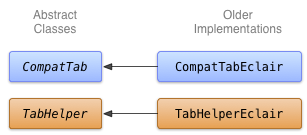本课程讨论如何创建既能反映新版 API 又能支持旧版设备的实现。
决定替代方案
以向后兼容的方式使用新版界面功能最具挑战性的任务是,为旧版平台决定并实现一个旧版(回退)解决方案。在许多情况下,可以使用旧版界面框架功能实现这些新版界面组件的目的。例如
-
应用栏可以使用水平
LinearLayout实现,其中包含图片按钮,可以作为自定义标题栏或作为 Activity 布局中的 View。溢出操作可以在设备 菜单 按钮下方呈现。 -
应用栏标签页可以使用包含按钮的水平
LinearLayout实现,或者使用TabWidget界面元素。 -
NumberPicker和Switch微件可以分别使用Spinner和ToggleButton微件实现。 -
ListPopupWindow和PopupMenu微件可以使用PopupWindow微件实现。
将新版界面组件向后移植到旧版设备通常没有一刀切的解决方案。请注意用户体验:在旧版设备上,用户可能不熟悉新版设计模式和界面组件。考虑如何使用熟悉的元素提供相同的功能。在许多情况下,这并不是一个大问题——如果新版界面组件在应用生态系统中非常突出(例如应用栏),或者交互模型非常简单直观(例如使用 ViewPager 的滑动视图)。
使用旧版 API 实现标签页
要创建旧版应用栏标签页实现,您可以使用 TabWidget 和 TabHost(尽管也可以使用水平排列的 Button 微件)。在名为 TabHelperEclair 和 CompatTabEclair 的类中实现此功能,因为此实现使用的 API 不晚于 Android 2.0 (Eclair) 引入。

图 1. Eclair 标签页实现的类图。
CompatTabEclair 的实现将选项卡属性(例如选项卡文本和图标)存储在实例变量中,因为没有可用的 ActionBar.Tab 对象来处理此存储
Kotlin
class CompatTabEclair internal constructor(val activity: FragmentActivity, tag: String) : CompatTab(tag) { // Store these properties in the instance, // as there is no ActionBar.Tab object. private var text: CharSequence? = null ... override fun setText(resId: Int): CompatTab { // Our older implementation simply stores this // information in the object instance. text = activity.resources.getText(resId) return this } ... // Do the same for other properties (icon, callback, etc.) }
Java
public class CompatTabEclair extends CompatTab { // Store these properties in the instance, // as there is no ActionBar.Tab object. private CharSequence text; ... public CompatTab setText(int resId) { // Our older implementation simply stores this // information in the object instance. text = activity.getResources().getText(resId); return this; } ... // Do the same for other properties (icon, callback, etc.) }
TabHelperEclair 的实现利用 TabHost 控件上的方法来创建 TabHost.TabSpec 对象和选项卡指示器
Kotlin
class TabHelperEclair internal constructor(activity: FragmentActivity) : TabHelper(activity) { private var tabHost: TabHost? = null ... override fun setUp() { // Our activity layout for pre-Honeycomb devices // must contain a TabHost. tabHost = tabHost ?: mActivity.findViewById<TabHost>(android.R.id.tabhost).apply { setup() } } override fun addTab(tab: CompatTab) { ... tabHost?.newTabSpec(tab.tag)?.run { setIndicator(tab.getText()) // And optional icon ... tabHost?.addTab(this) } } // The other important method, newTab() is part of // the base implementation. }
Java
public class TabHelperEclair extends TabHelper { private TabHost tabHost; ... protected void setUp() { if (tabHost == null) { // Our activity layout for pre-Honeycomb devices // must contain a TabHost. tabHost = (TabHost) mActivity.findViewById( android.R.id.tabhost); tabHost.setup(); } } public void addTab(CompatTab tab) { ... TabSpec spec = tabHost .newTabSpec(tag) .setIndicator(tab.getText()); // And optional icon ... tabHost.addTab(spec); } // The other important method, newTab() is part of // the base implementation. }
您现在有两种 CompatTab 和 TabHelper 的实现:一种在运行 Android 3.0 或更高版本并使用新 API 的设备上工作,另一种在运行 Android 2.0 或更高版本并使用旧 API 的设备上工作。下一课程讨论如何在您的应用中使用这些实现。
